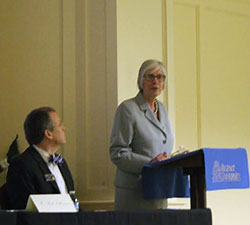
School of Law’s Journal of Global Justice and Public Policy Presents: “Coming to America: Impact of Juvenile Status on Immigration and Practice”

Among all of the issues under debate in the United States, the topic of immigration generally draws more interest and attention than any other topic in the nation.
And while the discussion surrounding immigration tends to focus on adults entering the country, what often goes unnoticed is how immigration laws impact the millions of children who are involved in the immigration process.
On Friday, March 3, Regent University School of Law’s (LAW) Journal of Global Justice and Public Policy tackled the issue during its symposium, “Coming to America: the Impact of Juvenile Status on Immigration and Practice.”
The symposium featured guest speakers and immigration law experts such as the Heritage Foundation’s Ronald Reagan’s Distinguished Fellow, Becky Dunlop; Clinical Fellow at the Immigration Law Clinic at Michigan State University School of Law, Beth Zilberman; and LAW adjunct professor Hugo Valverde ’05 (LAW).
The panel was moderated by LAW professor Jeffrey Brauch.
According to Zilberman, juvenile immigrants who enter the United States fall into two categories: unaccompanied refugee minors, who have gone through the refugee vetting process abroad; and the much larger category of unaccompanied children. These are children under 18 with no parent or guardian in the United States to protect them.
Because of this, more than 60,000 children who fall into these categories enter federal custody annually.
And while juvenile immigrants have the right to a lawyer, most of the time they lack representation – an issue Zilberman is combating with her work at the Michigan State Law Clinic.
This lack of legal and parental protection causes “major concerns for youth,” according to Zilberman, including being led into sex-trafficking or gang violence, simply because they lack adult guidance.
Dunlop asked LAW students to reflect on the elements of faith and principles that guide their way of thinking when it comes to following the rule of law.
“Oftentimes people get caught up in emotional issues like immigration and set aside their other values,” said Dunlop. “Our country, the United States of America, is exceptional. One of the foundational reasons of exceptionalism is the rule of law. And I hope every single one of you here at Regent University School of Law school thinks about this.”

